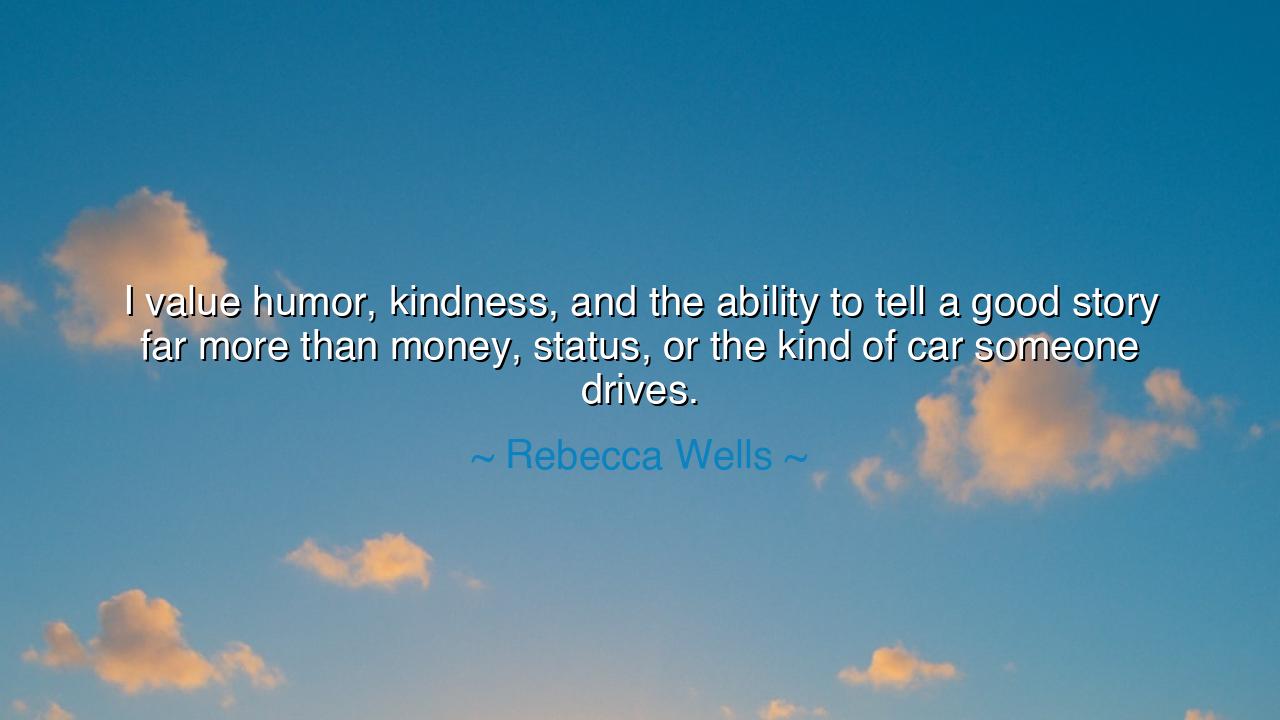
I value humor, kindness, and the ability to tell a good story far
I value humor, kindness, and the ability to tell a good story far more than money, status, or the kind of car someone drives.






In the grand pursuit of life, where ambition and wealth often dominate the hearts and minds of men, there stands a truth as old as time itself: true value lies not in the possessions we amass, but in the qualities that nourish the soul. Rebecca Wells, in her reflection, "I value humor, kindness, and the ability to tell a good story far more than money, status, or the kind of car someone drives," speaks to an ancient wisdom that has been passed down through generations. Her words echo the timeless understanding that while the world may prize external markers of success, it is the inner virtues—those of laughter, compassion, and connection—that hold the deepest worth.
In the teachings of the ancient Greeks, the philosopher Aristotle often spoke of virtue as the highest form of good. For Aristotle, a virtuous life was one that pursued wisdom, courage, justice, and temperance—qualities of the soul rather than the body. He argued that a life filled with external wealth and status was but a fleeting shadow, while the pursuit of virtue and inner growth brought true fulfillment. Wells's words mirror this ancient belief: that the qualities that sustain the soul—humor, kindness, and the ability to tell a good story—are far more valuable than the fleeting pleasures and prestige afforded by material wealth. True richness lies in the depth of our hearts and the warmth of our connections, not in the things we own.
The Romans, too, understood this principle. Cicero, the great statesman and philosopher, often wrote of the importance of inner character over external appearances. In his works, he spoke of the soul’s capacity for greatness, one that is not measured by the wealth of the individual but by the virtue they cultivate. Cicero taught that those who sought after money or status were ultimately chasing illusions, for these things could not nourish the soul. He believed that the true measure of a person lay in their ability to give—to offer kindness, wisdom, and laughter to the world. Like Wells, Cicero understood that the riches of the heart are far more enduring than the fleeting accumulation of earthly possessions.
Consider, too, the story of King Solomon, whose wisdom is immortalized in the Bible. Solomon, known for his great wealth and power, was once asked by the Almighty what he desired most. Rather than asking for wealth or military might, Solomon asked for wisdom. And when offered all the riches of the world, he declined, recognizing that the wisdom to lead his people and the compassion to rule justly were of far greater value than any material possession. Solomon’s story is a testament to the ancient truth that inner wisdom and kindness far outweigh the transient allure of money or status. Wells’s words about humor and kindness reflect this same truth: that the most enduring gifts we can offer are those of the spirit, not of the material world.
The ancient Chinese philosopher Laozi, in the Tao Te Ching, also spoke of the importance of the inner life over external possessions. He taught that true wealth was not in the things we owned, but in the peace and wisdom that resided in the heart. Laozi suggested that the more one seeks after material success, the more one distances themselves from the true, lasting riches of life—the wisdom of humor, the warmth of kindness, and the joy found in storytelling. His philosophy aligns perfectly with Wells’s view that the most precious things are those that cannot be bought or sold: the ability to laugh, to connect, and to share stories that enrich the lives of others.
The lesson, then, is clear and profound: true value lies not in what we own or the status we project, but in the qualities that nourish the soul. Wells reminds us that humor, kindness, and the ability to tell a good story are far more precious than any material wealth. In the grand story of our lives, it is the moments of shared laughter, the kindness extended to others, and the stories we tell that define us, not the possessions we acquire or the accolades we achieve. The ancients knew this truth well, and Wells brings it into the present with her reminder that what we give to the world through our character is far more enduring than anything we might possess.
In our own lives, let us remember this ancient wisdom and strive to cultivate those qualities that truly enrich the soul. Let us focus on being kind, finding humor in life’s trials, and sharing our stories with others. These are the things that bring true wealth—not the kind that can be counted in coins or acquired through status, but the kind that fills our hearts and the hearts of those around us. Just as Aristotle, Cicero, and Solomon understood, we must seek to live lives of virtue, where our inner riches—our humor, wisdom, and kindness—shine brighter than any material possession. Through this, we will create lives that are not only successful by the world’s measure but meaningful in the truest sense of the word.






AAdministratorAdministrator
Welcome, honored guests. Please leave a comment, we will respond soon